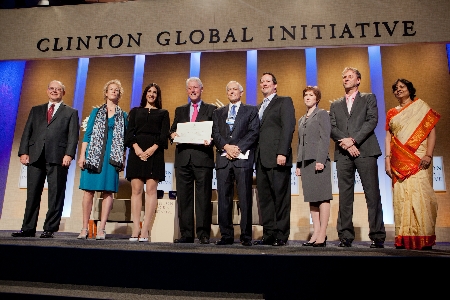In India, according to the World Bank, approximately 400 million people are without access to reliable electricity and an estimated 100,000 villages are without access to the national grid and receive no electricity. In these cases, the use of coal, kerosene, and other “dirty” fuel sources for power, cooking, and lighting provide energy with intermittent quality and reliability, as well as serious health and environmental concerns.
The lack of reliable light at night affects young students’ ability to study and these find it difficult to concentrate on their studies for an extended period of time, due to irritation and pain in the eyes caused by smoke and heat produced from kerosene lamps. These unsafe sources of energy also cause long-term lung conditions.
I’m thrilled to share, that the Applied Materials Foundation, (and our partners) E+Co and SELCO were invited to the Clinton Global Initiative (CGI) to announce our commitment to electrifying villages and schools and training social entrepreneurs in rural India. The CGI was established in 2005 by former President Bill Clinton and is an annual gathering of global leaders to devise and implement innovative solutions to some of the world’s most pressing challenges.

Former Supreme Allied Commander of NATO, Gen. Wesley Clark (center right) and former President Bill Clinton (center) with Applied Materials’ Mark Walker (far left) and others at the Clinton Global Initiative 2011 Annual Meeting. Image Credit: Cibele_Vieira/Clinton Global Initiative
This commitment aims to improve education, health, and economic opportunities for students and adults in India through the use of solar power electricity and lighting. Through this program, we will enable access to solar and LED lighting systems for 1,000 households and ten schools in villages – positively impacting an estimated 10,000 individuals – while also expanding household access to finance for home solar systems. This plan also provides training for entrepreneurs from Africa and Central America so that they can replicate the model in other regions. In addition to the direct human impact, this program will generate 279 kilowatts of clean, safe energy.
The commitment builds on successful past projects by our organizations and provides more opportunities to improve people’s lives in villages where sustainable, reliable energy is not yet available in an effort to create a cleaner and brighter future for all.
At Applied Materials, we know that our commitment to and involvement in the community are critical to our long-term sustainability. Through financial investments and employee involvement, we are helping to transform communities and improve the way people live.
 Follow
Follow